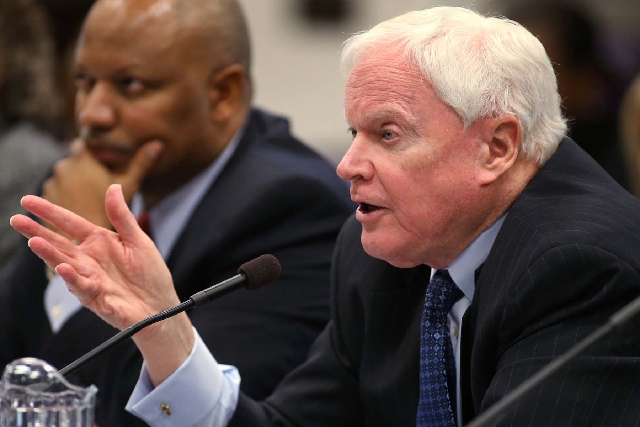Former Nevada schools leader seeks to pay top teachers $200,000

He resigned without explanation a month ago, but the former superintendent of Nevada public schools is now opening up about reforms that, he says, Gov. Brian Sandoval told him to forget.
“I don’t blame anybody but myself for not being persuasive enough,” former Superintendent James Guthrie said Friday about his March 29 resignation given under pressure because of his inability to gain the “governor’s confidence or attention.”
Guthrie’s sudden departure came just shy of one year after his appointment by Sandoval.
From the beginning, the governor and his superintendent didn’t see eye to eye, which was evident in a speech that Guthrie made a few months into his job, on April 2, 2012.
Guthrie declared that the top tier of Nevada teachers should be paid $200,000. The unprecedented salary would make education in Nevada competitive with other professions and draw the best teachers to the Silver State’s struggling schools, he said.
However, Guthrie quickly abandoned the idea because the governor’s office called the next day, told him it was out of the question and to drop it.
Officials from the governor’s office declined to comment Friday.
Now that he is out of the office, Guthrie has returned to his bold push for reform, which is strongly opposed by the Nevada State Education Association, teachers union Executive Director Gary Peck said.
Guthrie has written a detailed analysis of the $200,000 teacher and how that would be cheaper and more effective in improving student performance than Sandoval’s proposed 2014 education budget, which has $135 million in add-ons to existing school programs. The analysis was commissioned by conservative think tank Nevada Policy Research Institute.
It’s something Guthrie hasn’t been able to do until now.
Although Nevada schools are caught in a “downward spiral” and need a bold change, “powerful protectors of the status quo can quickly mobilize political allies sufficient to quash almost any disruptively innovative idea,” he writes in the report to be released Monday.
Guthrie’s predecessor, Keith Rheault, who retired in 2012, warned of such a chilling effect after 11 years as state superintendent. At that time, the governor had won the power to appoint and replace the superintendent under a change made by state lawmakers.
“If you don’t follow what the governor wants, I don’t know how long you can get away with that,” Rheault then said of his replacement, Guthrie. “That will make it much more political than it has been.”
Guthrie discovered that and resigned because he had become more of a “political liability than asset,” he said.
Conceding the proposition is politically risky, Guthrie asserts that Nevada needs something drastic like his plan to “jar the system loose” and attract and retain effective teachers.
Here’s the problem and his proposal.
The problem: All Nevada teachers receive the same base pay as others in their district, regardless of performance, receiving automatic raises for seniority and earning extra college credits, but nothing for performance, offering “little incentive to excel,” he writes.
That’s the opposite of the private sector, where top-level lawyers, engineers and other professionals make $200,000 for being the best, he said.
The proposal: Pay Nevada’s top 2,000 educators $200,000 each, which is about twice what the state’s highest-paid teachers currently make.
Paying all of Nevada’s 20,000 teachers that much would cost about $2 billion, but paying that much to just top-level teachers would cost $200 million.
Here’s where Peck objects, claiming that if raises aren’t “across the board,” it doesn’t work.
The efforts of the 18,000 other teachers would be diminished, he said.
“This kind of skewed investment, giving substantially more to a very small cadre of people, is not the answer,” Peck said.
Elaine Wynn, president of the State Board of Education, disagrees, claiming across-the-board raises for all teachers don’t provide incentive for them to excel, thereby improving student performance.
In the common workplace, raises aren’t automatically given to everyone, but are selectively given to those for good work, as they should be, she said.
“Is $200,000 the number? I don’t know,” Wynn said. “But conceptually, I’m in total agreement.”
Guthrie also said that teacher bonuses of a few thousand dollars won’t change anything.
“If you’re not going to make it dramatic, don’t bother,” Guthrie said. “It won’t capture attention.”
The 2,000 “master teachers” wouldn’t be paid $200,000 indefinitely, but would be given a one- or two-year contract to work where most needed, Guthrie said. Those teachers could remain at the top pay grade if their students’ improved test scores keep them among Nevada’s 10 percent of teachers.
While that sounds good, Peck questioned who would pick the top 2,000 teachers and how the comparisons would be made between teachers in different subject areas and specialties.
“Systematically, we don’t have the answer,” Peck said.
Nevada is already seeing that problem in trying to evaluate all teachers based on students’ standardized test scores when only 30 percent of teachers have students taking the tests.
It won’t be easy, Guthrie said.
“School matters, and right now schools are broken,” Guthrie writes. “The time has come for Nevada to think big.”
Contact reporter Trevon Milliard at
tmilliard@reviewjournal.com or 702-383-0279.